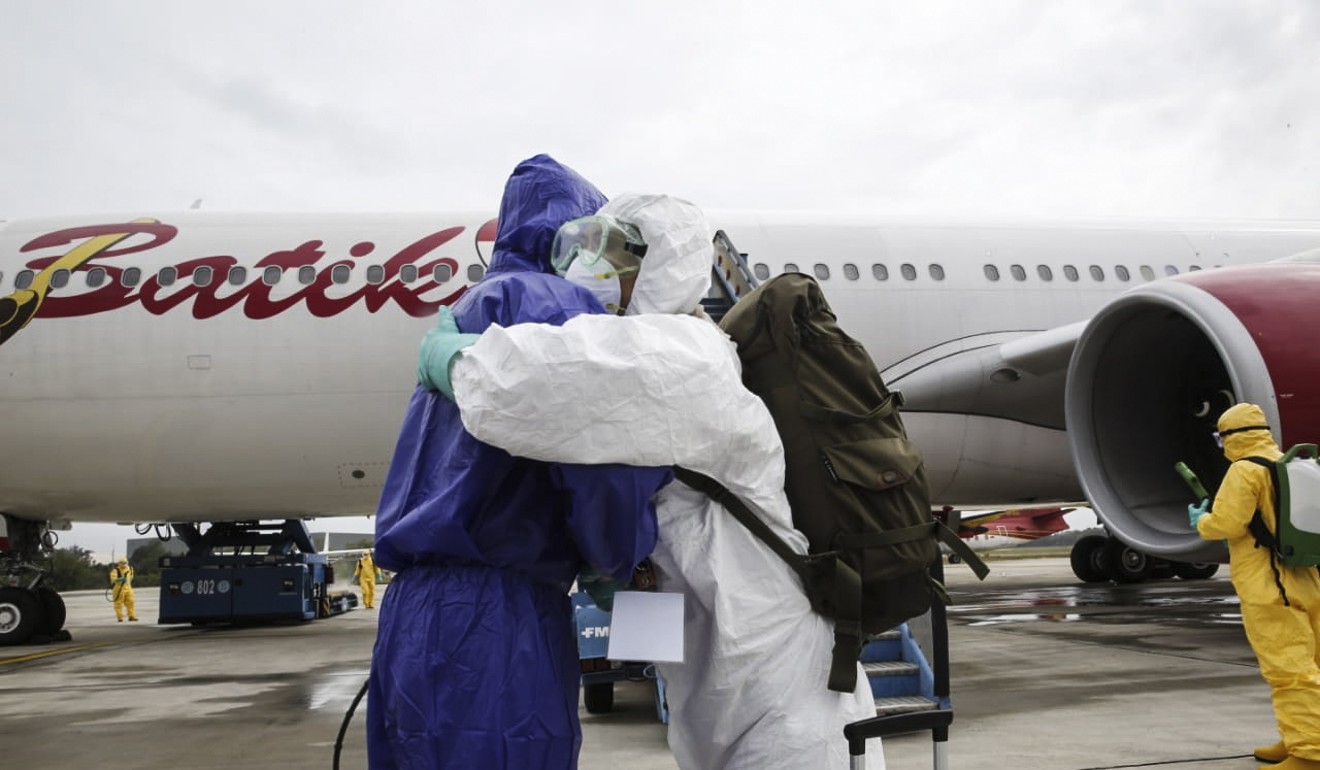
No coronavirus, but Indonesia’s handling of Wuhan evacuees highlights erosion of trust
- The government put 238 citizens evacuated from Wuhan into quarantine on the Natuna Islands without telling local authorities or residents
- The episode provides a telling example of the national government’s lack of policy coordination on such matters
Based on World Health Organisation rules, Indonesia should have first demonstrated that it had the facilities and infrastructure to support health protocols in the evacuation of its citizens from Wuhan. One of the required facilities under WHO rules is a place of isolation, away from population centres.
Coronavirus: how Diamond Princess cruise ship became a ‘super spreading’ site
Health Minister Terawan Agus Putranto said there were several reasons Natuna was the most appropriate place for a quarantine: the military complex on Natuna Besar, the main island, is equipped with a hospital that can accommodate 300 patients; the hospital is close to an Air Force aircraft hangar and 6km away from the nearest residential area; and the Natuna military complex had enough personnel to closely monitor the schedules and activities of the 238 evacuees.
The Ministry of Health also said specialist doctors were on-site to monitor the situation, and that the evacuees were continuously monitored and offered trauma healing therapy. In addition, periodic checks and disinfection procedures were carried out in accordance with WHO protocols in an effort to minimise and prevent transmission.
The government said none of the quarantined people had shown signs of being infected with the coronavirus, although some had experienced headaches, stomach aches, itching and fatigue unrelated to the virus. There are no confirmed cases of the virus in Indonesia.
Although that is all good news, what was not good news was how the Indonesian government coordinated its response to the evacuees.
For one, the local government – the Natuna Regency – said the national government did not coordinate with it when choosing the quarantine location. The head of the Natuna Regency, Abdul Hamid Rizal, said he was informed of the decision to use the Natuna facilities as the quarantine spot the day before the evacuees arrived from Wuhan – and that he heard the news from media reports, not directly from the central government.
When residents of Ranai city, the administrative centre of Natuna regency on Natuna Besar, heard the same muddled media reports on the matter, hundreds of them immediately gathered at the Regional Peoples Representative Council building to voice their objections to the national government using Natuna as a quarantine location.
On the day the evacuees arrived, mass demonstrations took place in front of the Ranai Naval Base and in the Representative Council building’s yard, with those in attendance speaking out against the national government’s decision and also burning tyres.
The protesters demanded that the evacuees be moved from the Natuna hospital to the Indonesian Navy’s Special Medical Warship on Natuna to minimise the risk of contagion.
They also called on the central government to provide an emergency health services post – a temporary information and health centre specific to Natuna – and that the Ministry of Health also build an office on Natuna. Perhaps most important, they demanded that the national government’s policy decisions be coordinated first with the Natuna government and disseminated to Natuna residents.
Although the central government did hold a meeting with the Natuna government after the fact, its response came too little, too late. In addition, the information it gave to Natuna residents was mostly incorrect.
In the most egregious instance, the commander of the Indonesian Army, Hadi Tjahjanto, stated that the distance from the quarantine site to the nearest residential area was 5km to 6km away, when in fact there was a densely populated village just 1km away. It was such statements that raised the ire of Natuna residents and caused them to look on the central government as engaging in a form of public deception.

And it was just such a deception that showed the paternalistic instincts of the national government, not to mention its lack of a concrete action plan, leading to a panicked response by local residents, many of whom feared going to schools, markets and offices, resulting in the halt of normal daily activities there.
The fears of the locals were such that some even were reported to have fled to Pontianak on Kalimantan Island, the nearest major Indonesian city to the Natuna Islands, and other cities to avoid being infected by the coronavirus. And given that the evacuees from Wuhan were dropped onto Natuna almost entirely wrapped in plastic, the reaction was not entirely out of line.
As one resident stated after seeing the plastic-sheathed evacuees: “People are shocked. The government says it guarantees the health of Natuna residents, but why do they wear clothes like that and not us?”
Coronavirus: why did Singapore have more cases than Hong Kong – until now?
With such legitimate fears, it is easy to see why the central government needs to strengthen its policy coordination plans with local governments the next time a wave of incoming health evacuees, or indeed any other sort of refugees, come Indonesia’s way.
The most important step is to have better communication with regional governments. The fact that the Natuna government knew about the arrival of evacuees only from the news indicates the lack of proper communication between the central and regional governments.
It is also important for the government to connect directly with the people there; perhaps through public discussion. Many residents of the islands have only minimal educations and have only heard about the coronavirus from television. This only served to exacerbate the situation.
Through the simple act of raising awareness levels of the people on Natuna about the crisis situation in a timely fashion, the national government could have avoided the worst-case outcome, but in this instance, the worst outcome is what it got.

